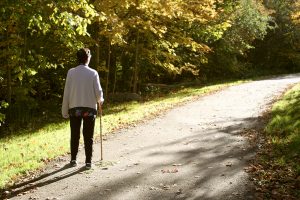How Senior Care Can Help During a COPD Flare Up
Category:

Chronic obstructive pulmonary disorder, or COPD, is a condition that affects the lungs. It can sometimes get worse without warning. When this happens, it is called a flare up. While a COPD flare up can be frightening, senior care can help your aging relative to deal with a flare up more comfortably and with less worry.
Causes of a COPD Flare Up
Flare ups are often triggered by something, such as a cold or lung infection because of a virus or bacteria. Other triggers include:
- Cigarette smoke and other air pollutants.
- Changes in the weather.
- Overexertion.
- Stress or anxiety.
Signs of a COPD Flare Up
The signs of a COPD flare up can last for two or more days. If the flare up gets too bad, it can result in a hospital stay. However, sometimes when a flare up is caught early and managed with medications and other methods, it can be taken care of at home. Some common signs of a flare up include:
- Difficulty catching breath.
- Wheezing.
- Coughing.
- Being unable to take a deep breath.
- Trouble sleeping.
- Anxiety.
- A bluish tint to the skin.
- Trouble saying full sentences.
- Headaches that occur in the morning.
Ways Senior Care Can Help
Senior care can assist older adults with COPD to avoid flare ups and manage them when they do occur. Some things that senior care can do are:
- Trigger Avoidance: Senior care providers can help to keep the older adult away from air pollutants, including cigarette smoke. They can also keep the older adult indoors when changes in the weather may impact them.
- Medication Reminders: When signs of a flare up do occur, the senior care provider can remind your aging relative to use a fast-acting inhaler or other medication prescribed by the doctor.
- Stress and Anxiety Relief: Having a COPD flare up can not only be triggered by stress or anxiety, it can cause them, too. A senior care provider can comfort the older adult during a flare up to help them stay calmer, which can ease symptoms.
- Calling for Help: Senior care providers can watch for signs the older adult needs medical attention. If so, they can contact a family caregiver to set up a doctor appointment. Or, if emergency help is needed, the senior care provider can call 911.
By contacting a senior care agency, you can schedule a provider to visit your older family member as often as necessary. They can fill in gaps in the care calendar when family members are unavailable or provide care for seniors who do not have relatives living nearby.
Sources
https://medlineplus.gov/ency/patientinstructions/000698.htm
https://www.healthline.com/health/copd/steps-for-managing-copd-flare#3
https://www.lung.ca/lung-health/lung-disease/copd/flare-ups
Subscribe
Date: July 10, 2020
Category:


